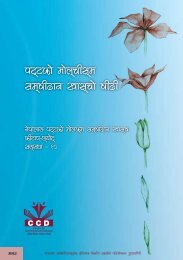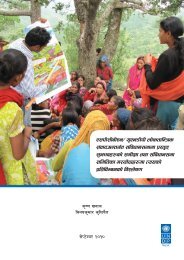English - Support to Participatory Constitution Building in Nepal ...
English - Support to Participatory Constitution Building in Nepal ...
English - Support to Participatory Constitution Building in Nepal ...
Create successful ePaper yourself
Turn your PDF publications into a flip-book with our unique Google optimized e-Paper software.
This should make us aware of the issue of<br />
secession. Federalism should be established<br />
by develop<strong>in</strong>g it on the basis of its positive<br />
aspects. It is a scientific system and people<br />
can have disagreements about it. We need<br />
discussion on both the positive and negative<br />
aspects of federalism. However, the economic<br />
situation can’t be the decid<strong>in</strong>g fac<strong>to</strong>r for<br />
establish<strong>in</strong>g federalism <strong>in</strong> a country. Both a<br />
poor country like Ethiopia and a rich country<br />
like Switzerland practice federalism.<br />
Q. What is the mean<strong>in</strong>g of the nonterri<strong>to</strong>rial<br />
prov<strong>in</strong>ce demanded by the Dalit<br />
community? - Resham Gurung<br />
A. Non-terri<strong>to</strong>rial prov<strong>in</strong>ces are found<br />
<strong>in</strong> Belgium and Ethiopia, but they are<br />
comparatively few <strong>in</strong><br />
practice and are not<br />
as functional as other<br />
forms of prov<strong>in</strong>cial<br />
adm<strong>in</strong>istration. A nonterri<strong>to</strong>rial<br />
prov<strong>in</strong>ce can<br />
provide<br />
representation<br />
for the Dalit community<br />
but it cannot ensure access. The provision of<br />
a Dalit Council would be more appropriate.<br />
The Council could provide suggestions and<br />
develop Dalit-focused laws <strong>to</strong> ensure Dalit<br />
rights <strong>in</strong> different sec<strong>to</strong>rs of the state.<br />
More queries concern<strong>in</strong>g federalism <strong>in</strong> the<br />
context of <strong>Nepal</strong> are <strong>in</strong>corporated <strong>in</strong> a later<br />
section of this report.<br />
micro level while at macro level it recognized<br />
Dalit, women and Madhesi as m<strong>in</strong>orities and<br />
provided their rights.<br />
Economic capability and<br />
geography should be<br />
considered <strong>in</strong> demarcat<strong>in</strong>g<br />
the federal prov<strong>in</strong>ces.<br />
-Shuv Nath Mishra<br />
Participants expressed the op<strong>in</strong>ion that all<br />
the prov<strong>in</strong>ces have not been created on<br />
the basis of recogniz<strong>in</strong>g the identity of the<br />
local community. Mr. Bip<strong>in</strong> Chandra Dhakal<br />
argued that there was no demand for the<br />
prov<strong>in</strong>ces of Jadan, Narayani and Khaptad<br />
and they do not recognize the identity of<br />
any community. However, Yam Bahadur<br />
Tamu stated, “It is difficult <strong>to</strong> build a new<br />
structure by break<strong>in</strong>g the old one, but at this<br />
time we have no alternative <strong>to</strong> federalism <strong>in</strong><br />
<strong>Nepal</strong>. We should not debate much on the<br />
borders of the prov<strong>in</strong>ce because the federal<br />
structure has addressed the issues of the<br />
ethnic community.” They<br />
all agreed on the need<br />
<strong>to</strong> develop a team of<br />
geographical<br />
experts,<br />
economists, and political<br />
experts <strong>to</strong> draw up the<br />
appropriate demarcation<br />
of the federal state.<br />
Some specific questions related <strong>to</strong> the<br />
prov<strong>in</strong>cial level structure are listed below<br />
with Prof. Hachhethu’s responses.<br />
Q. Federalism has been demanded<br />
<strong>to</strong> decentralize the system. How will<br />
federalism address this issue and provide<br />
accessibility? - Khadga <strong>Nepal</strong>i<br />
Presentation on the Federal structure at<br />
the Prov<strong>in</strong>cial Level<br />
Present<strong>in</strong>g the prov<strong>in</strong>cial structure, Prof.<br />
Krishna Hachhethu stated that the report of<br />
the CSRDSP did not provide m<strong>in</strong>ority rights at<br />
A. Federalism decentralizes power and authority<br />
and supports the provision of accessible services<br />
<strong>to</strong> most people <strong>in</strong> the country. However,<br />
accessible services such as the issuance of<br />
citizenship, passports and so on for everyone <strong>in</strong><br />
all 14 prov<strong>in</strong>ces are still not possible.<br />
16 Federalism Dialogues Series 5




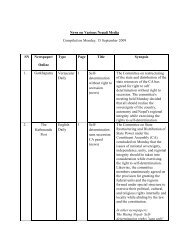

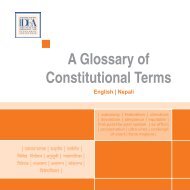
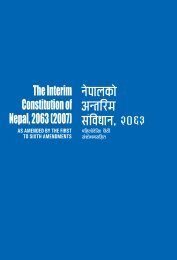
![g]k fnsf blntx? / gofF ;+l jwfg](https://img.yumpu.com/49483602/1/184x260/gk-fnsf-blntx-goff-l-jwfg.jpg?quality=85)
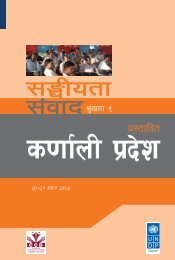
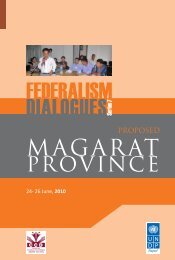
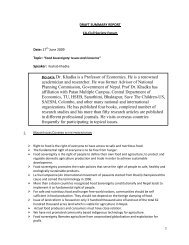
![+ljwfg;ef, /fHosf]k'g](https://img.yumpu.com/41604075/1/184x260/-ljwfgef-fhosfkg.jpg?quality=85)
